 Petzlover
Petzlover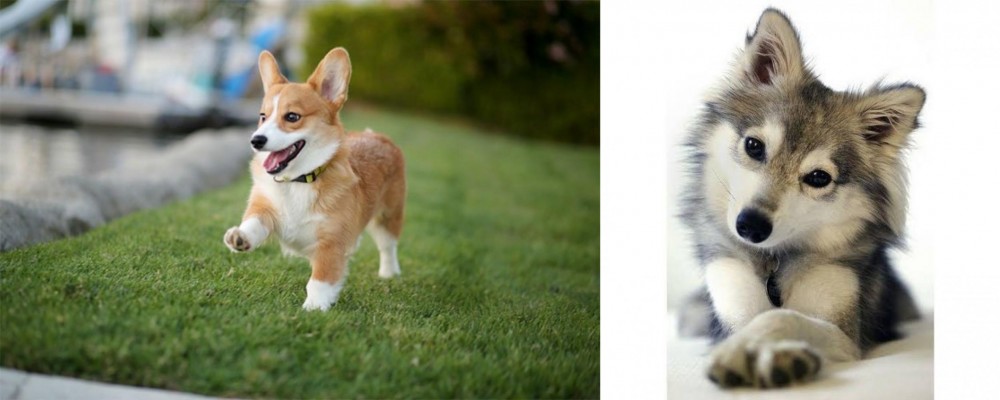 Corgi is originated from United Kingdom but Miniature Siberian Husky is originated from United States. Corgi may grow 9 cm / 3 inches shorter than Miniature Siberian Husky. Both Corgi and Miniature Siberian Husky are having almost same weight. Both Corgi and Miniature Siberian Husky has same life span. Both Corgi and Miniature Siberian Husky has almost same litter size. Corgi requires Low Maintenance. But Miniature Siberian Husky requires Moderate Maintenance
Corgi is originated from United Kingdom but Miniature Siberian Husky is originated from United States. Corgi may grow 9 cm / 3 inches shorter than Miniature Siberian Husky. Both Corgi and Miniature Siberian Husky are having almost same weight. Both Corgi and Miniature Siberian Husky has same life span. Both Corgi and Miniature Siberian Husky has almost same litter size. Corgi requires Low Maintenance. But Miniature Siberian Husky requires Moderate Maintenance
 Known as a cattle herding dog breed, the Corgi hails from Pembrokeshire, Wales. You get 2 breeds – the Cardigan Welsh Corgi and the Welsh Corgi.
Known as a cattle herding dog breed, the Corgi hails from Pembrokeshire, Wales. You get 2 breeds – the Cardigan Welsh Corgi and the Welsh Corgi.
The word ‘Korgi’ actually means ‘dwarf dog’. According to some, the small dog’s history goes back as far as 1107AD, but when you start doing research, you find that the Pembroke Welsh Corgi doesn’t have a traceable breed history.
The Pembrokeshire Corgi was officially recognized by the Kennel Club in the United Kingdom in 1934 and is a breed separate from the Cardiganshire Corgi.
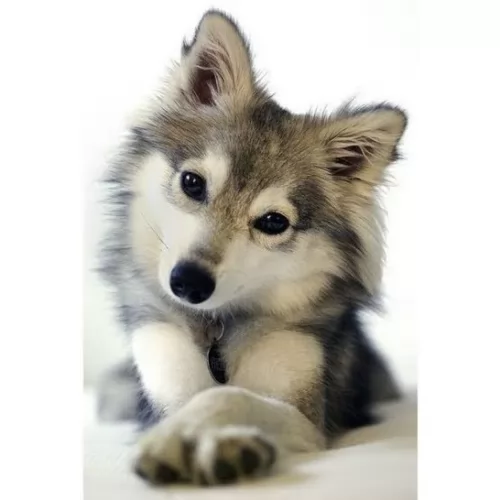 Miniature Siberian Huskies – also known as mini huskies – are your regular Siberian husky bred to be that much smaller than what the breed standard dictates.
Miniature Siberian Huskies – also known as mini huskies – are your regular Siberian husky bred to be that much smaller than what the breed standard dictates.
They’re sought after by those who love the regular sized Siberian Husky but who find the larger dog too large and boisterous. They come complete with the looks and the temperament of the Siberian Husky but they are smaller.
The origins of these gorgeous Mini huskies is conflicting though as some believe they originated in the USA. The name of Bree Normandin is bandied about when talking of the breed’s origin while other refer to Linda S. Spurlin from Alaska. She became interested in them when her full-sized husky became pregnant by a small dog.
Spurlin used Siberian and Alaskan Huskies as well as small Schipperkes and American Eskimo Dogs to bring about the mini version. They’ve got the same pedigree as the Siberian Husky, but it has been selectively bred for its smaller size, also coming from the Spitz family of dogs.
The Miniature Husky is genetically the same as the larger Siberian Husky and the AKC doesn’t recognize it as a separate breed, but sees it as a different size variation of the working-group Siberian Husky.
 The Corgi is a small to medium sized dog, standing at 25 to 30cm and weighs between 10 to 14kg.
The Corgi is a small to medium sized dog, standing at 25 to 30cm and weighs between 10 to 14kg.
The coat of the Corgi is fairly short to medium length and is thick. You’ll find him to be available in colors such as red, fawn, black and tan and with white markings.
He has a sharp, intelligent face with an amicable expression. Looking much like a fox with short legs, he has a long, low-set body body and is a sturdy dog. His ears also stand erect and he has a docked tail.
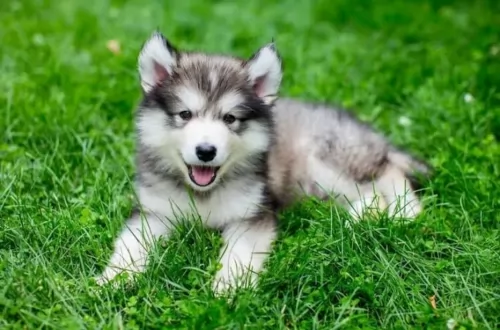 Known also as the Alaskan Klee Klai,the Miniature Siberian Husky stands at 33-39cm in height and weighs between 8 - 11kg.
Known also as the Alaskan Klee Klai,the Miniature Siberian Husky stands at 33-39cm in height and weighs between 8 - 11kg.
These mini huskies are like the larger huskies and can also come in a range of color variations such as grey and white, black and white or red and white for instance. In typical Spitz dog fashion they have the erect ears and long bushy tail. A striking feature of these dogs is the beautiful eyes – they can be brown but also a mesmerising blue.
This Miniature Siberian Husky is an intelligent dog and you’re not going to have any trouble with him teaching him some basic commands such as sit, lie-down and stay.
You need to know that these dogs aren’t going to be content lying around all day and that they want to be kept busy almost around the clock. They have always been working dogs so he will need plenty of mental – and physical exercise to keep him content. A bored, frustrated Mini Husky will just develop problem behavior through no fault of his own. People who buy high energy dogs have a responsibility towards them to keep them busy and well exercised.
These dogs are similar to their genetic ancestor, the wolf, and instead of barking, you may find him trying to communicate with a howl. One thing is sure, they make great family pets, and their gentle nature allows them to get on well with children and also not to show aggression with other dogs. They’re loyal, outgoing and charming.
 The sweet little Corgi is well known with his association with Britain’s Queen Elizabeth who has always loved these dogs with their long bodies and short legs. But while the Corgi may well be associated with royalty, he isn’t too snooty by any means to be your pet.
The sweet little Corgi is well known with his association with Britain’s Queen Elizabeth who has always loved these dogs with their long bodies and short legs. But while the Corgi may well be associated with royalty, he isn’t too snooty by any means to be your pet.
He has got a wonderful personality, and he is just waiting to be allowed into your household where he will prove to be a loving, devoted companion and friend.
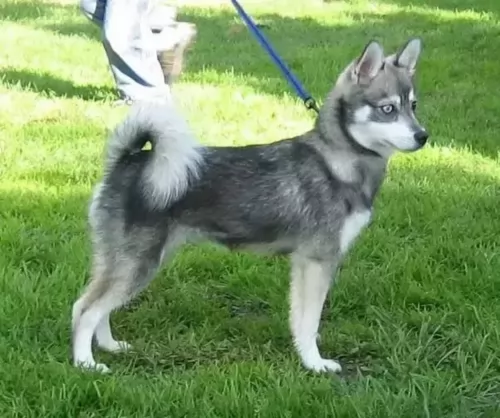 Your cuddly Mini Siberian Husky is such an intelligent dog, active and social and guaranteed to make you a splendid pet.
Your cuddly Mini Siberian Husky is such an intelligent dog, active and social and guaranteed to make you a splendid pet.
Being somewhat wary and aloof with strangers, they also make good watchdogs. They do well with children who have been taught to be kind and gentle with animals.
With good care your dog can reach up to 15 years of age, providing you with many years of superb friendship.
 A corgi, when he is well looked after, can live to be anything from 12 to 15 years of age. However even this sturdy dog may well be susceptible to some of the more common dog illnesses, such as hip dysplasia and degenerative myelopathy.
A corgi, when he is well looked after, can live to be anything from 12 to 15 years of age. However even this sturdy dog may well be susceptible to some of the more common dog illnesses, such as hip dysplasia and degenerative myelopathy.
Also you have to be careful with your Corgi and make sure that he doesn’t gain weight as this weight gain can bring with it a host of health complications.
Hip dysplasia with your Corgi is about an abnormal joint structure where the bones lose contact with each other. This parting of the bones is known as subluxation, and it is this subluxation that can cause your pet pain and discomfort and lead to osteoarthritis.
This disease isn’t reserved for old dogs either, and some young dogs can begin to show signs of this disease before they reach their first birthday. Without taking your dog to the vet and having medical intervention, your pet may eventually be unable to walk.
It is so sad when Degenerative Myelopathy invades your pet as it is a devastating disease watching your pet become paralyzed. The disease seems to come on when then dog is between 8 and 14 years of age where your pet loses co-ordination in the hind limbs, getting worse until he can no longer walk. Often your dog can no longer control his urine output.
There are no real treatments that have stopped the progression of the disease and your vet may suggest treatments that can make your pet more comfortable You vet may compassionately suggest your dog be put down, particularly for those people who can’t afford treatment.
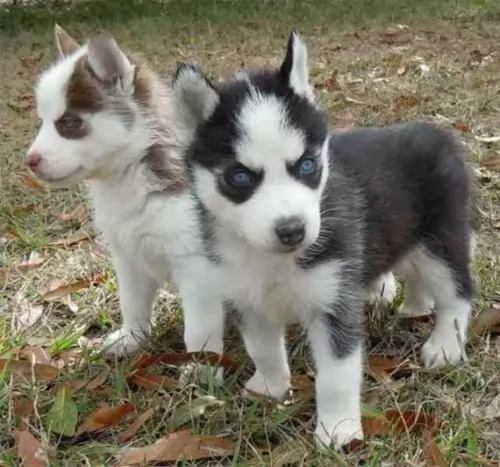 Your Miniature Siberian Husky is a healthy dog and you won’t have to spend too much money on him at the vet. However, just like with any other dog, he can battle with some of the common dog diseases -
Your Miniature Siberian Husky is a healthy dog and you won’t have to spend too much money on him at the vet. However, just like with any other dog, he can battle with some of the common dog diseases -
This eye problem affects about 10% of all Siberian Huskies and its not limited to old dogs. Juvenile cataracts can affect young dogs too. Luckily the problem isn’t painful for the dog.
Skin problems can be a concern for the Mini Siberian Husky, especially as one is used to seeing these dogs with thick coats. Follicular dysplasia is a genetic condition that causes patchy hair loss as well as a scaly, infected skin.
Check out that your dog is receiving nutritious food with vitamins and minerals as a zinc deficiency for instance can cause hair loss as well as skin problems.
 The Corgi isn’t a particularly heavy shedder, so a brush down twice a week will be excellent for his thick coat. And of coarse he will thrive on the attention given to him during the brushing session.
The Corgi isn’t a particularly heavy shedder, so a brush down twice a week will be excellent for his thick coat. And of coarse he will thrive on the attention given to him during the brushing session.
Corgis love walks and sniffing around as they go along. They’re energetic dogs so you’ll need to include him in your daily walks which he just loves, and include him in some ball games.
Corgis may be short in stature but they are robust dogs – sturdily built. They are active dogs and can use up a lot of calories. They will certainly require a diet that features good quality protein.
Feed your Corgi a good quality food designed for special life stages – puppy, adult, pregnant female, senior dog and also dogs with illnesses.
Most Corgis do well having 2 meals of kibble a day. Puppies usually eat 4 meals a day until they are old enough to move onto an adult feeding schedule. Include cooked rice, meat and vegetables in his diet as well as raw meat from time to time and ensure there is always a bowl of clean, cool water available.
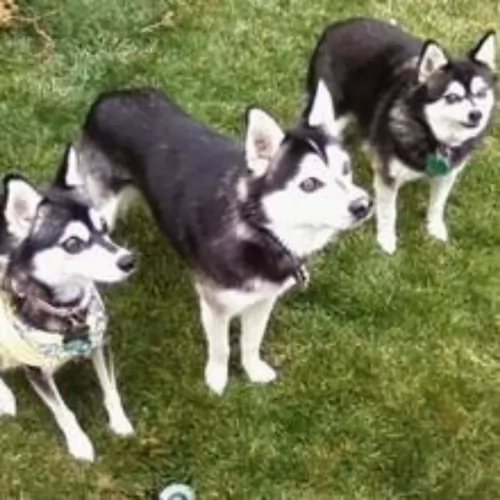 The Miniature Husky is an active and energetic breed that is going to require a lot of exercise. He is able to adapt to life in the city or the countryside but wherever you keep him as a pet, he will require regular daily exercise.
The Miniature Husky is an active and energetic breed that is going to require a lot of exercise. He is able to adapt to life in the city or the countryside but wherever you keep him as a pet, he will require regular daily exercise.
These dogs are used to cold climates so make sure your Mini Siberian Husky doesn’t overheat. Make sure that when he’s outdoors, there is shade for him and a water bowl. You’ll be doing him a real favor if you provide him with a small paddling pool to dip into on a hot day.
These are clean, odorless dogs that actually require little human help to be groomed. You can give your dog a good brush twice a week.
Mini Siberian Huskies, like the larger breed, have a high metabolism, so small amounts of highly nutritious food will do well with them. If you intend feeding your one commercially manufactured food, make sure its the high quality food that comes with plenty of minerals and vitamins. Try and avoid the low quality brands that come packed with unhealthy preservatives and colorants.
Dogs do well on simple, nutritious diets, so some boiled chicken, brown rice and raw and cooked vegetables such as carrots, potatoes and spinach added into the dry kibble from time to time will do him wonders.
Also try and include some raw meat into the kibble from time to time. That's it, as simple as that- no exotic, spicy foods and foods which we humans eat such as nuts, chips and chocolate – all can be toxic for your pet and just give him an upset stomach.
Make sure fresh, cool water is constantly available.